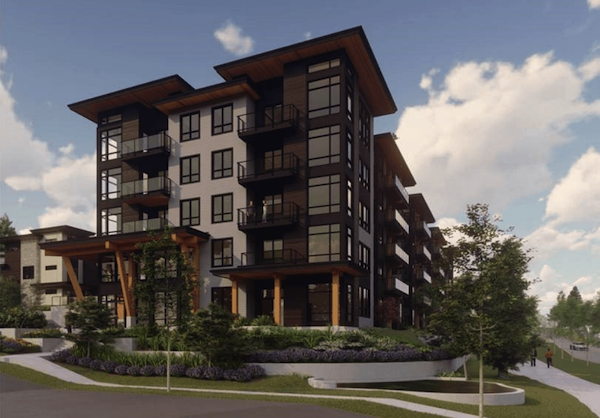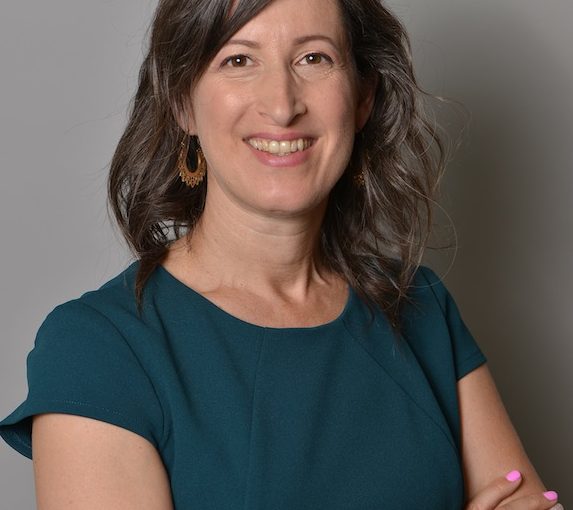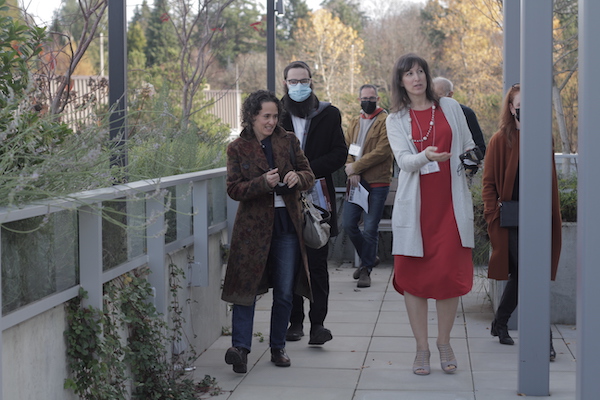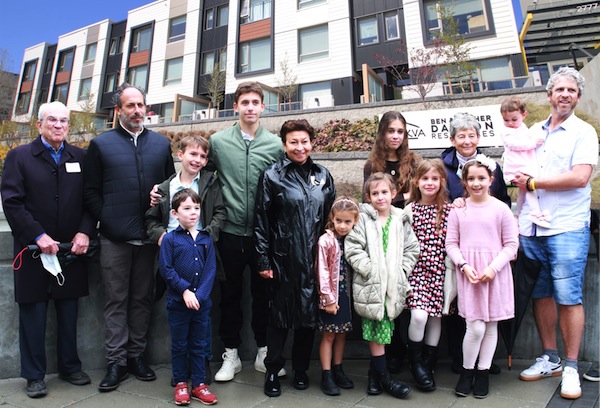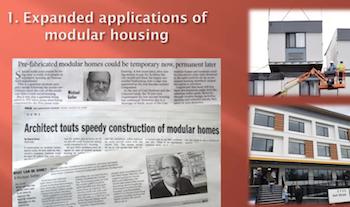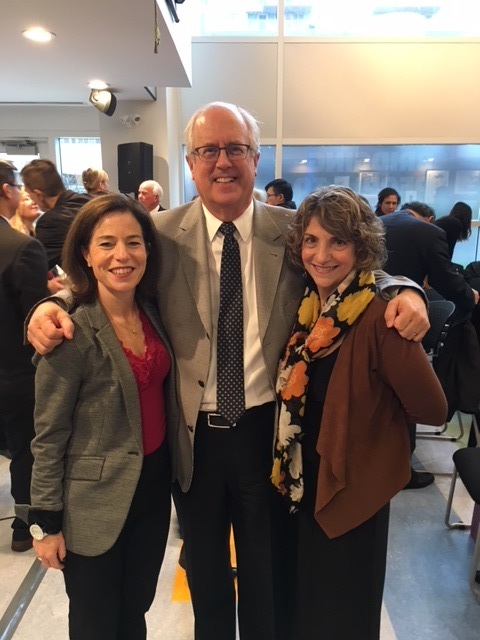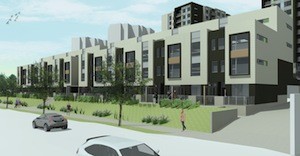Left to right: Linda Thomas (Tikva), Shirley Barnett, Shelley Karrel (Tikva) and Eldad Goldfarb (Jewish Community Centre of Greater Vancouver) at Tikva Housing’s annual general meeting on Dec. 7. (photo from Tikva Housing)
The following remarks have been slightly modified from the original talk given at the Tikva Housing Society annual general meeting on Dec. 7, 2017, which took place at the Jewish Community Centre of Greater Vancouver.
I am sure some of you, if not most of you, are wondering, “Why has Shirley been asked to speak tonight?” I wondered the same thing. So, with some trepidation, I accepted the invitation to say a few words, but will start off with a few disclaimers.
First of all, I really don’t know much about housing. I have never been a part of any task force on housing. I have never attended a conference on housing. Experts in the field are in the media every single day, exploring solutions and dealing with options to solve Vancouver’s escalating housing crisis. Ideas range from adding back the 13th floor of high rises, using that floor for public amenities, to establishing a $100 million fund to speed up development applications. Other ideas have surfaced that call for a complete change in our zoning regulations.
Today, I was at a luncheon and sat next to two women who live at the Performing Arts Lodge (better known as the PAL Housing complex), which is across from the Westin Bayshore. They live under an arrangement I had previously heard about, called a life lease, which sort of bridges renting and ownership. You pay an entry fee for the right of a lifetime lease or for a fixed long-term period. That’s your equity. The society invests the money and you get your money back when you leave.
I have also heard about SAMs, shared appreciation mortgages, where mortgages are granted in exchange for sharing in the profits when the property is sold. This idea has been used to make down payments. The City of Calgary in a partnership with the Province of Alberta established a program whereby forgivable interest-free loans are provided through a housing society they started, and owners remit some of the equity when they leave or sell.
In Vancouver, no matter what the underlying causes are of the “affordability” issue, the very word conjures up the image of ownership as a priority. If we can, let’s discard that vocabulary for a minute and look at some alternative models because the one thing the experts agree on is that there is a need to think differently. Recently, I read there is no “housing crisis” but that there is a “housing supply myth” and we are building beyond our population numbers. In light of this, the City of Vancouver has stated they are now looking at the demand and not the supply.
What is the demand for housing in our own Jewish community?
Time and time again, people have expressed concern about members of our community moving away from the Oak Street corridor. This is already a reality and it will continue. So, instead of talking about people moving out, let’s talk about people moving into new neighbourhoods.
During the 2017 annual campaign, Jewish Federation of Greater Vancouver’s theme was to connect people who live in other municipalities or cities near Vancouver to Jewish programs and services. Their slogan for this was, “We can’t afford to lose them.” I have learned that Federation has hired a community development worker to liaise with emerging Jewish communities and that they are contacting many Jewish people who live in Langley, Maple Ridge, Abbotsford and so on, to ascertain what Jewish components residents in these places want in their lives and in their children’s lives; what initiatives they want to start or enhance or with which they need help.
We know that when an initiative comes from the grassroots, it becomes an emotional experience and, when there is emotion in a group of stakeholders, there is motivation, action and progress. This is how the Burquest Jewish Community Association started, which now has more than 70 families drawn from Burnaby, New Westminster, Coquitlam, Port Moody and further east. The Chabad Centre for Judaism of the Lower Fraser Valley in Surrey started very small and also has grown tremendously. Closer to home, Or Shalom on Fraser Street, which used to be on the outskirts of Vancouver, is now in the city centre and is thriving. East Side Jews, a Temple Sholom initiative, recently had 80 people turn out for an event. And, last summer, 60 kids in outlying areas went for the first time to a Jewish summer day camp run by the Jewish Community Centre of Greater Vancouver. So, we know that Jewish communities can begin and grow outside of Vancouver’s “traditional” neighbourhoods.
If there were an incentive for 10 Jewish families to move somewhere, maybe there could be resources to help them – rental subsidies for house-sharing, help to start a new daycare centre or to open a satellite shul in someone’s basement. Maybe the next development for Tikva Housing should be in one of the smaller communities that is growing a new Jewish population.
But let’s return for a moment to the situation in Vancouver. And let’s explore the availability of the existing housing inventory. Dozens of Jewish families own hundreds of condos in this city. If one unit per building or even one unit per owner were made available for Tikva to manage, this would create an inventory of housing. Tikva manages the inventory; it becomes a clearinghouse for rentals. And Tikva’s rental subsidy program could kick in – it would ensure that these units remain affordable, while providing owners with rental income at market rates. Alternatively, the owners of these rental or condo buildings could donate a unit to Tikva or become major donors to the Esther Dayson Rental Subsidy Program. So many more families could be helped by the above ways – like interest, the success would be compounded so many times.
What about incentives to families willing to create new suites from their unfinished basements and assign those new units to Tikva to manage, again creating new rental stock? I am not sure if you need a permit to finish off your basement but you may need some financial help. Perhaps that is an area of lending for the Hebrew Free Loan Association.
With the major redevelopment of Oakridge Centre and across the street from the Vancouver JCC at the former transit centre and all along 41st Avenue, as well as the need to redevelop both the current JCC and the Louis Brier Home and Hospital, we are in for an exciting time. The entire area will be repurposed and densified, whether we like it or not, and we need to do our part in a new, different way.
This should be the time when Tikva works together with Yaffa Housing, with the Vancouver Jewish Building Society that, together with the Netherlands Association, has 133 units, and with the Shalom Branch of the Canadian Legion that has 102 units. It boggles the mind (or, at least, my mind) that, for a community as small as ours, there are four Jewish housing societies that, for the most part, do not work together. Imagine the benefits that could be accomplished if these agencies were merged or formed loose partnerships or even a central registry. Why should someone in need in our community have to deal with sorting out the various agencies and options? But that’s a topic for another meeting.
There are more and more newspaper articles about redoing the concept of single-family zoning areas. There is much discussion about how large homes can be repurposed. How many people really want or need a home in Shaughnessy, on Marine Drive or in Richmond with eight or nine bedrooms and the same number of bathrooms? Should the city allow the change of dozens of these homes into four or six units for purchase or rental? Of course. What about financial incentives for young Jewish families, empty nesters or seniors who would like to share a large home but can’t afford the renovations to do so?
There is a philosophy about “aging in place,” staying in your own home until such time as your health requires you to leave. What about when your finances require you to leave because you can’t afford to pay your taxes or for the home’s upkeep? A recent article in the Vancouver Sun stated that one-third of the senior population, mostly women, live alone, and many suffer from depression, financial need and social isolation. We need to rethink what it means to live at home. Many people have said they don’t want to live in complexes built only for people their own age. This is a huge factor in senior living.
The same Sun article quotes a study published by the Gerontologist Society of America, which argues we have to broaden our meaning of “place” from an individual home to mean a neighbourhood. It continues, “Home is a refuge, but it is as much the background of the home, the familiarity with the places and contacts around it that provide security, as any emotional attachment to the home itself.”
We know people can feel as isolated and as disconnected living in a condo as they would living alone in a house. Not only do we need amenities in buildings but inviting spaces, not just gyms but places where the coffee and the lights are always on, lobbies where people can meet and chat – a community within a building within a neighbourhood.
Let me illustrate this point with a great example of building a new neighbourhood without cost. Those of us who live in condos know that the key fobs to enter our units usually cannot be used on other floors; you can’t visit someone on another floor without going down to the lobby and buzzing back up. We know that the intention is greater security and preventing unwanted visitors, but Tikva used an innovative approach. When the 18 units of the Diamond Residences in Richmond were being built, the fobs to the units on the Tikva floors – floors 12, 13 and 14 – were calibrated to give access to all the Tikva floors. You don’t have to go outside the building and buzz someone to get back in to visit them or borrow a cup of sugar. Families can visit other residents on the other Tikva floors. Children can go back and forth from their own apartments to their friends or relatives. That’s building a new neighbourhood.
As I mentioned before, I have no experience in solving these types of issues but I do know that the solutions will take much more creativity than we have ever seen, creativity at many different levels, including from within our Jewish community. One of my favourite quotations is from Albert Einstein, who said, “No problem can be solved by the same level of consciousness that created it.”
I believe Tikva not only has a role in community development but also an expanded role. Our family feels good about this. We think we have chosen wisely to support the initiatives of Tikva because of their potential in being a leader in this area: affordable housing using many different models, but together with community development. My brother Philip Dayson and I are privileged to be able to participate in Tikva’s new project on Marine Drive – imagine 32 family homes in a new Jewish community in a land trust implemented by a group of nonprofit organizations together with the City of Vancouver. And we are very proud to say this complex will be named after our parents.
I cannot close without remembering the brilliance of Susana Cogan, z”l, and, thinking of her, we will recommit our support to Tikva Housing with the expectation that this organization will lead us down new pathways and, like Susana, show imagination, strength and leadership outside of anyone’s box.
***
More about Tikva Housing’s AGM
Tikva Housing had its annual general meeting on Dec. 7, 2017, at the Jewish Community Centre of Greater Vancouver, with approximately 50 people in attendance. The society provided an overview of its current housing capacity, the ongoing need for affordable housing and the challenges facing the Metro Vancouver Jewish community with regards to housing.
Tikva has 18 units in the Diamond Residences, in Richmond, which opened in September 2017; 11 units at the Danny Guincher Residences; and 32 units will be available at the Esther and Ben Dayson Residences, in Vancouver, opening in summer 2018. The society has the Esther Dayson Rent Subsidy Program, which supports approximately 40 recipients.
Tikva’s main partners are the Jewish Federation of Greater Vancouver, which maintained annual funding for Tikva’s operations for 2017/18; Jewish Family Services, which refers people who are in need of affordable housing; and Kehila Society, which links tenants living in the Diamond Residences with events and services in Richmond.
The units at Diamond Residences range from studios to three-bedrooms. Because of the Diamond Foundation, as well as the Irving and Phyliss Snider, Lohn and Zalkow foundations, which contributed to the capital costs, it is posible to offer rents set at 30% of household income.
The Esther and Ben Dayson Residences is a partnership of Tikva Housing with the Community Land Trust Foundation and City of Vancouver. Its townhouses, ranging from two- to four-bedrooms, will offer 16 units for families on income assistance and 16 units renting at 30% of household income. The Ben and Esther Dayson Charitable Foundation have committed to fund Tikva’s equity loan to the Vancouver Land Trust project.
– Courtesy of Tikva Housing Society
